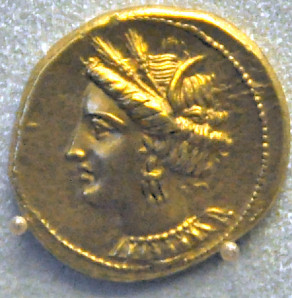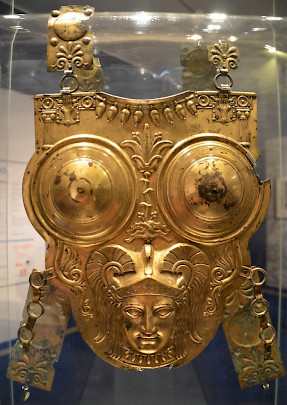Carthaginian Empire
Carthage (Phoenician Kart hadašt, "new city"): important ancient city, close to modern Tunis.
Empire

No doubt, the Carthaginian towns often had to fight against people in the hinterland, the Numidians. We are poorly informed about these wars. We are not better informed about later conflicts like, say, the Iberian wars, but unfortunately, the ancient inhabitants of Hispania did not leave many written accounts. Nor did the Carthaginians. The only place where we can see their imperialism at work, is on Sicily, where the Greeks and Carthaginians seem to have been in an almost perennial war.
We know that in the mid-sixth century, Carthage supported the Phoenician towns against Greek Selinus; that they fought against the Spartan prince Dorieus, who tried to build a city within the Carthaginian part of the island (c.510); that in 480 the Carthaginian leader Hamilcar was defeated near Himera by Gelon, the tyrant of Syracuse; that a commander named Hannibal renewed the war at the end of the fifth century and organized the Sicilian towns into one province; that a treaty was signed in 405; and that war flared up every now and then during the fourth century. We know of fighting in the years 397-392, 382-373, 368-362 (all against Dionysius I and II), 345-339 (against Timoleon; text); and in 311-306 against Agathocles.
Because the Greeks and Carthaginians were close, an interesting document about Carthage was written by a Greek observer: in his Politics, the philosopher Aristotle of Stagira offers an analysis of the Carthaginian constitution (text).

During all these wars, for which Diodorus of Sicily is our main source, Carthage was sometimes defending itself against Greek aggression, and just as often, it was the other way round. There is not a clear-cut pattern, and it would be wrong to state that Carthage consistently pursued an imperialistic policy, like Assyria, king Philip II of Macedonia, or Rome. On the other hand, Carthage was not a peaceful city pursuing a mercantile policy either. It was a republic and there were several factions with differing opinions and policies.
In 278 BCE, war was renewed; this time, the Sicilian Greeks found a champion in Pyrrhus of Epirus, who had already defeated the Romans and was now called to Sicily. He was successful, but after his victories, the Greeks refused to give him the soldiers to finish the job, and Pyrrhus went back to Italy, where he was defeated by the Romans. He commented that Sicily would be the cockpit for the Carthaginians and Romans to fight in, and this prophecy turned out to be correct.